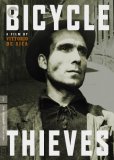| Reviews & Columns |
|
Reviews DVD TV on DVD Blu-ray 4K UHD International DVDs In Theaters Reviews by Studio Video Games Features Collector Series DVDs Easter Egg Database Interviews DVD Talk Radio Feature Articles Columns Anime Talk DVD Savant Horror DVDs The M.O.D. Squad Art House HD Talk Silent DVD
|
DVD Talk Forum |
|
|
| Resources |
|
DVD Price Search Customer Service #'s RCE Info Links |
|
Columns
|
|
|
Bicycle Thieves - Criterion Collection
THE MOVIE:
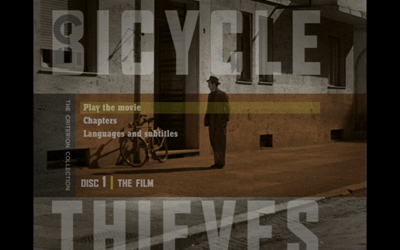
Vittorio De Sica's Bicycle Thieves (Ladri di biciclette) is one of those movies that I think more people have heard about than have necessarily seen it. More commonly known as The Bicycle Thief (the title of this Criterion edition is the accurate translation of the original), this 1948 Italian film is the most well-known entry in the Neorealist movement. De Sica and the other post-War directors in Italy were striving for a cinema that mattered, that used the common language of real life to say something about contemporary experience. Shot on the streets of Rome, it's not flashy or overly histrionic. Rather, its economy of style makes way for a complex morality play that illustrates what can happen to a man when he's pushed against the wall for too long.
I think I first caught Bicycle Thieves on PBS sometime in the early 1990s. The Player had already come out, and I knew it was the film that brings the Tim Robbins character's own moral quandary into stark relief. Its placement in that story was also a reminder to the hollow film executive that movies had a social power beyond the commercial trash his studio was prone to greenlight. The authentic feel of De Sica's vision plays in sharp contrast to Robert Altman's slick Hollywood thriller even as it indicts the same.
The story is simplicity itself. Antonio (Lamberto Maggiorani), a struggling family man, finally gets a job after a long dry spell. The only catch is he needs his bicycle in order to perform his duties, and in an O. Henry-style twist, he pawned the bike to feed his family. Thanks to some quick thinking and self-sacrifice on the part of his wife (Lianelle Carell), he is able to get the bike out of hock and report for duty. Only, in yet another cruel machination of fate, the bike is stolen from him while he works.
Having the next day off, Antonio goes out into Rome to look for the stolen property himself. He takes his son Bruno (Enzo Staiola) with him, because the young boy knows the bicycle like the back of his hand. As they search through the black market and pursue suspects into churches and bordellos, Bruno serves as a kind of Jiminy Cricket figure. His perplexed questioning of his father's actions spurs Antonio on through aggravation while also reminding him why it's so important that he keep his job. Finally, when it seems like there will be no justice for his family, Antonio must answer the age-old philosophical question: is it okay to steal a piece of bread when your family is starving?
Lamberto Maggiorani plays Antonio as a quiet, stoic man. There are many instances in Bicycle Thieves where you start to think he doesn't have the fortitude to see the given task through. When it comes to confronting other people, he really has to screw up his courage in order to not back down. De Sica uses the city as almost another character. Its wide open spaces feel desolate, and alternating images of poverty and opulence weigh on Antonio, never letting him forget the conundrum he is caught up in.
The climax of Bicycle Thieves is fraught with nervous tension and heartbreak. Once again, it's Bruno who is going to serve as the final commentator on the scene, his agony of seeing his father break being more painful than the break itself. Enzo Staiola is really quite good. For a first-time child actor, he seems just as comfortable with the emotional elements as he is joking around with his dad. Sometimes, you think the kid has more guts than the adult, but then Antonio gives him just the right look that says, "You really don't understand how the world works." By the end of the day, Bruno will understand, and Antonio's feelings of failure hurt all the more due to the realization that he can't protect his son from the onslaught of reality any more than he can the pangs of hunger. De Sica must have had some kind of magic touch to cultivate the chemistry of a father/son bond between the two; then again, he's got a knack for capturing the emotions that pass from person to person, because the chemistry between Antonio and his wife also comes across as effectively sincere.
Really, that's the true trick of Neorealism. Vittorio De Sica wasn't just trying to capture the reality of his surroundings, he was also drawing real human emotions out of his actors. It appears that the best route was just giving them a true-to-life scenario that doesn't flinch from the tough questions and letting the performers do their thing. It's the punch-to-the-gut of honest feelings that makes Bicycle Thieves so emotionally harrowing. The power of its conclusion hasn't dimmed at all in nearly sixty years, and the film is likely still going to be relevant in sixty more.
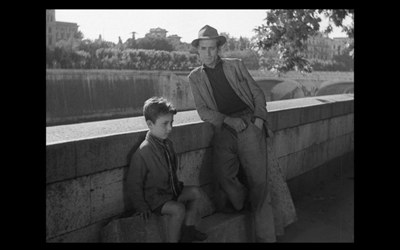
THE DVD
Video:
The Criterion Collection has rescued Bicycle Thieves from the oblivion of substandard DVDs. There is an older edition of this movie that came out several years ago, but it was nowhere near the quality that it should have been. Criterion has used a newly restored, high-definition transfer for this deluxe package. Presented in a full-frame 1.33:1 aspect ratio, the black-and-white photography has been scrubbed up quite a bit. It's quite exceptional for the most part, though not all the glitches could be ironed out. You will still see some lines running down the picture in a few scenes, and there are also several image jumps where a quick splice causes a stutter in the middle of some action. These things thankfully only show up a handful of times, the infrequency suggesting they are a necessary evil and not the product of negligence.
Sound:
The original Italian soundtrack is here, mixed in mono, with a brand-new subtitle translation. The sound is pretty good, though with the usual dubbing quirks fans of Italian cinema are used to. The subtitles read well and move at a good space.
For those who may want it, the old English dub is also an option. I flipped over to it a couple of times just to hear what it was like, and the dialogue doesn't really match the subtitles. Also, it didn't sound like Criterion put a ton of effort into cleaning it up. There was an obvious drop in audio quality when I switched over from the Italian.
Extras:
Bicycle Thieves – Criterion Collection is a high-end double disc set. The DVDs sit on plastic trays in a folding cardboard case, which then fits inside a nicely printed slipcase with the thick book On Bicycle Thieves. The book is 76 pages long and bound with a nice paper stock. It features photos, credits, and a number of essays on the film, including contemporary critical assessments, classic articles by the movie's writer Cesare Zavattini and its champion André Bazin, and more personal pieces by Sergio Leone, the director's son Manuel, and Vittorio De Sica himself, among others.
DVD 1 of the set holds the film and has no additional extras.
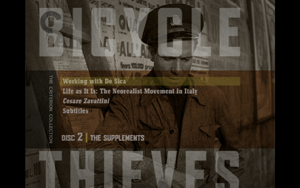
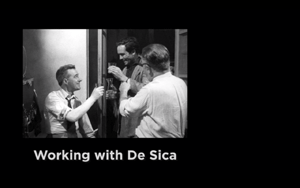
DVD 2 is the full supplement disc, and Criterion offers three separate features:
* Working With De Sica (22 minutes, 40 seconds): Contemporary interviews with actor Enzo Staiola, scholar Callisto Cosulich, and one of the film's screenwriters, Suso Cecchi d'Amico, detail how the film came together and the experience of being part of the now famous production. Staiola in particular has some good stories about how he got involved in the picture.
* Life as It Is: The Neorealist Movement in Italy (40:00): Author Mark Shiel explains what "Neorealism" is. By his count, there are seven central films in the movement--three by Rossellini, three by De Sica, and one by Visconti--and around 250 in total. He gives a detailed explanation of the style of the movies, what the filmmakers were reacting against, and what they were inspired by. He's pretty good about bringing his points back to Bicycle Thieves, which I appreciated. It makes it more than a tangential featurette, using the movie in question more as the catalyst for the discussion than merely as a cursory element. Shiel also explains why Italian films were always dubbed rather than having synced sound, thus addressing the anomalies I mentioned above. I had never heard the reasons before!
* Cesare Zavattini (55:40): A documentary from 2003 about the primary screenwriter on Bicycle Thieves and a long-term collaborator of De Sica's. Zavattini had a long and varied career that included journalism, prose writing, and painting, and he was a profound thinker, theorizing on the effect of cinema and always looking forward at where film could go next. Many directors and other film personalities speak about their hero and mentor, including Bernardo Bertolucci (whose father was a classmate of Zavattini's), Roberto Benigni, and Marco Belocchio. Even the director of the documentary, Carlo Lizzani, appears as a commentator. The film is illustrated liberally with clips from his many movies and archival footage of the man himself, including great shots of him dictating dialogue to a secretary.
FINAL THOUGHTS:
Highly Recommended The Bicycle Thieves – Criterion Collection package is a stellar presentation of an important film. While other landmarks of cinema might have lost their power over the years, existing more as intellectual curiosities and historical footnotes, De Sica's portrait of a working father who is running out of options is still emotionally powerful and morally relevant. In many ways, the Neorealist technique is just as important in these days of the DV revolution as they were in post-War Italy. The concerns of the poor and the plight of the family will also strike home, proving that the best works of socially concerned art are the ones that don't forget to be art first and foremost.
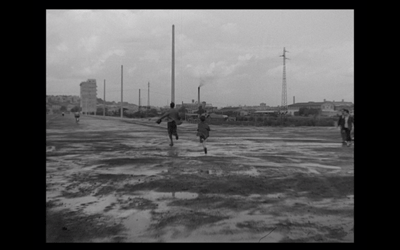
Jamie S. Rich is a novelist and comic book writer. He is best known for his collaborations with Joelle Jones, including the hardboiled crime comic book You Have Killed Me, the challenging romance 12 Reasons Why I Love Her, and the 2007 prose novel Have You Seen the Horizon Lately?, for which Jones did the cover. All three were published by Oni Press. His most recent projects include the futuristic romance A Boy and a Girl with Natalie Nourigat; Archer Coe and the Thousand Natural Shocks, a loopy crime tale drawn by Dan Christensen; and the horror miniseries Madame Frankenstein, a collaboration with Megan Levens. Follow Rich's blog at Confessions123.com.
|
| Popular Reviews |
| Sponsored Links |
|
|
| Sponsored Links |
|
|
| Release List | Reviews | Shop | Newsletter | Forum | DVD Giveaways | Blu-Ray | Advertise |
|
Copyright 2024 DVDTalk.com All Rights Reserved. Legal Info, Privacy Policy, Terms of Use,
Manage Preferences,
Your Privacy Choices | |||||||









